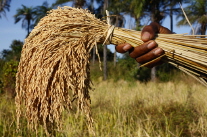
Typical street scene in Santa Ana, El Salvador. (Photo: iStock)
IMF Survey: Poorer Countries Should Try to Reduce Reliance on Agriculture
November 11, 2011
- Agriculture is imperfect safety net against food price volatility
- Shift to other sectors can increase labor productivity, expert says
- Create insurance mechanisms to protect main crops
Low-income countries should strive to move beyond their traditional reliance on agriculture to achieve higher growth and protect their economies from food price swings, economist Abhijit Banerjee said at a conference.

Rice farming in Senegal. Poor countries should diversify away from agriculture to achieve higher growth, says Banerjee (Philippe Lissac /Godong/Corbis)
Low-income country seminar
In an interview with IMF Survey online, development expert Banerjee of the Massachusetts Institute of Technology explained the impact of increasing global demand for food and why poor countries should consider moving their populations out of agriculture into more productive employment. He said countries should move toward higher investment and productivity in agriculture.
IMF Survey online: What is the impact of increasing global demand for food on low-income countries?
Banerjee: There are some countries that are dealing with the fact that China's growth—which is a wonderful thing—and to a lesser extent India's growth are increasing demand for a set of commodities. If you happen to be a net buyer of those commodities, you are in trouble.
If you take the countries which are food scarce, they are having a hard time right now. The combination of drought and the general rise in world food prices means there are a bunch of countries in Eastern Africa that are having a particularly difficult time. If we really think that commodity price instability is the way of future, do we really want poor people to be involved in the commodity industries, in particular agriculture?
Right now, the rural sector is an imperfect insurance mechanism. Most developing countries do not really have a safety net. You either go into retail or agriculture. Those are the two places where you end up.
My point is that the safety net has just got a lot less safe. It was never a great safety net, but now there is an additional layer of risk. If that safety net goes away, what is left?
IMF Survey online: So you are encouraging labor to move away from agriculture and from food because of the instability. Yet, you think that maybe the bigger players should put their energy in that very sector?
Banerjee: Absolutely. How do you get people out of agriculture? This is going to be the big challenge for the next 20 years. I think countries need to move some people out of agriculture and move a different kind of people, who can make bigger investments and who can raise productivity, into agriculture.
It is something that is going to happen, but it is, politically, extremely fraught because what do you do with those people and what do you do with the people who are going to suddenly end up without an occupation?
I think countries are right in being very nervous about this issue. On the other hand, if productivity has to go up, it is something that will have to happen. This is a very delicate issue, probably the most difficult issue.
IMF Survey online: When you say that people should move away from agriculture, are you talking about jobs that have already been created or do those jobs not exist yet?
Banerjee: If you ask me if I can name the exact industry in Kenya that is going to be the industry where they will be absorbed, the answer is “no, I do not know.” Jobs will have to be created. We will not know where. It certainly varies a lot, but I think different kinds of jobs, more urban and using more specific kinds of skills, will emerge.
IMF Survey online: You are well known for both thinking about economic policy from a macro perspective and a micro perspective. Can you give an example of the way that situations can be improved for low-income countries on the macro level?
Banerjee: I am not a huge believer in the power of macro policy to directly help poor people. That being said, one direction, which I think is quite obvious, is to think of better insurance mechanisms for countries which have to deal with food crises.
For example, I think one issue that needs to be dealt with is creating a set of insurance markets where countries can insure their main crops. At the moment, there is a similar concept. You could sell on the futures markets.
However, if you are a major producer in these markets, you quickly realize they are not great for providing insurance as such. So you really do want to think of mechanisms for linking to commodity prices.
IMF Survey online: Do you see commodity volatility then as a macro or a micro problem?
Banerjee: All problems are eventually micro problems because it is people's lives that get affected by them and, to be honest, different people's lives get affected differently. On the one hand, if you think of somebody who is rising soybean prices and who has acres of land, he is probably doing well out of that. On the other hand, somebody who has one acre and has to buy food, since he is a net buyer of food, that is actually bad for him. So it is always a micro problem.


